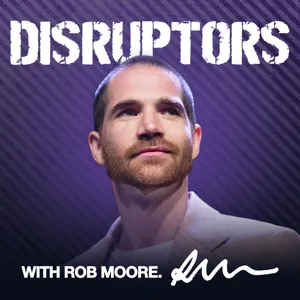Is comedy under threat from woke culture? Join Rob as he talks to comedian and writer Russell Kane all about cancel culture, comedy and business. They also delve deep into the difficulties of masculinity in the modern world and the role of social media in comedy and mental health.
KEY TAKEAWAYS
- Russell Kane doesn’t think that there is a war on comedy. Some of the most popular comedians of today say very controversial things such as Ricky Gervais and Jimmy Carr.
- More things can be said now than back in the 70s, we’ve just changed what can’t be said.
- When words cause violence or real psychological damage, then it’s not ok.
- You need boundary, argument and debate at the periphery of comedy, that’s where the humour lies.
- Russell learnt, through copywriting and comedy, to separate his ego from his art and creativity. He learnt to handle rejection well.
- Russell never planned to go into comedy, it was simply one of the things he thought he would try and it turned out that he was good at it!
- Comedy for Russell was like crack cocaine, his life was falling apart, yet he kept going back to stand up for more. He had to make a decision ,and this is when he quit his job.
- Russell approaches his comedy career like a business. It’s one of the ways he protects himself from setbacks.
- Coming from a working class background and living an ordinary life before comedy means that Russell always has and still can, tap into how an ordinary person thinks.
- The more successful you get as a comedian, the more negativity you pick up along the way.
- Look for the ideas that don’t make sense, this is often where the magic lies and Russell has seen this again and again in both business and comedy.
- Planning for the future is something Russell has always focuses on. He has always had a plan and diversified ways to make a living for now and the future too.
- If you aren’t willing to put in the work to build a stand up career, then you aren’t going to have a career full stop.
- Practice is the key to success for comedy. Russell is so successful because he has worked hard and spent time refining and practicing his art.
- A lot of what people are interpreting as anti-freedom of speech is actually just unsophisticated AI, it’s often just technology gone wrong.
- Masculinity is a mess; this is why Kane started his series Man Baggage, exploring exactly this.
- We need better sex education and emotional education for men.
BEST MOMENTS
“People forget how much we can say now”
“Does it cause harm, hate or criminal activity in the real world, if not it’s probably ok”
“My first language remains chav”
“Slow, highly engaged growth is what you want [on social media])
“It’s all practice, I’m not genius at work here I probably just have more willpower”
“Something has gone wrong with masculinity”
“Men use humour as a salve”
VALUABLE RESOURCES
https://robmoore.com/
bit.ly/Robsupporter
https://robmoore.com/podbooks
rob.team
ABOUT THE HOST
Rob Moore is an author of 9 business books, 5 UK bestsellers, holds 3 world records for public speaking, entrepreneur, property investor, and property educator. Author of the global bestseller “Life Leverage” Host of UK’s No.1 business podcast “Disruptors”
“If you don't risk anything, you risk everything”
CONTACT METHOD
Rob’s official website: https://robmoore.com/
Facebook: https://www.facebook.com/robmooreprogressive/?ref=br_rs
LinkedIn: https://uk.linkedin.com/in/robmoore1979
disruptive, disruptors, entreprenuer, business, social media, marketing, money, growth, scale, scale up, risk, property: http://www.robmoore.com

